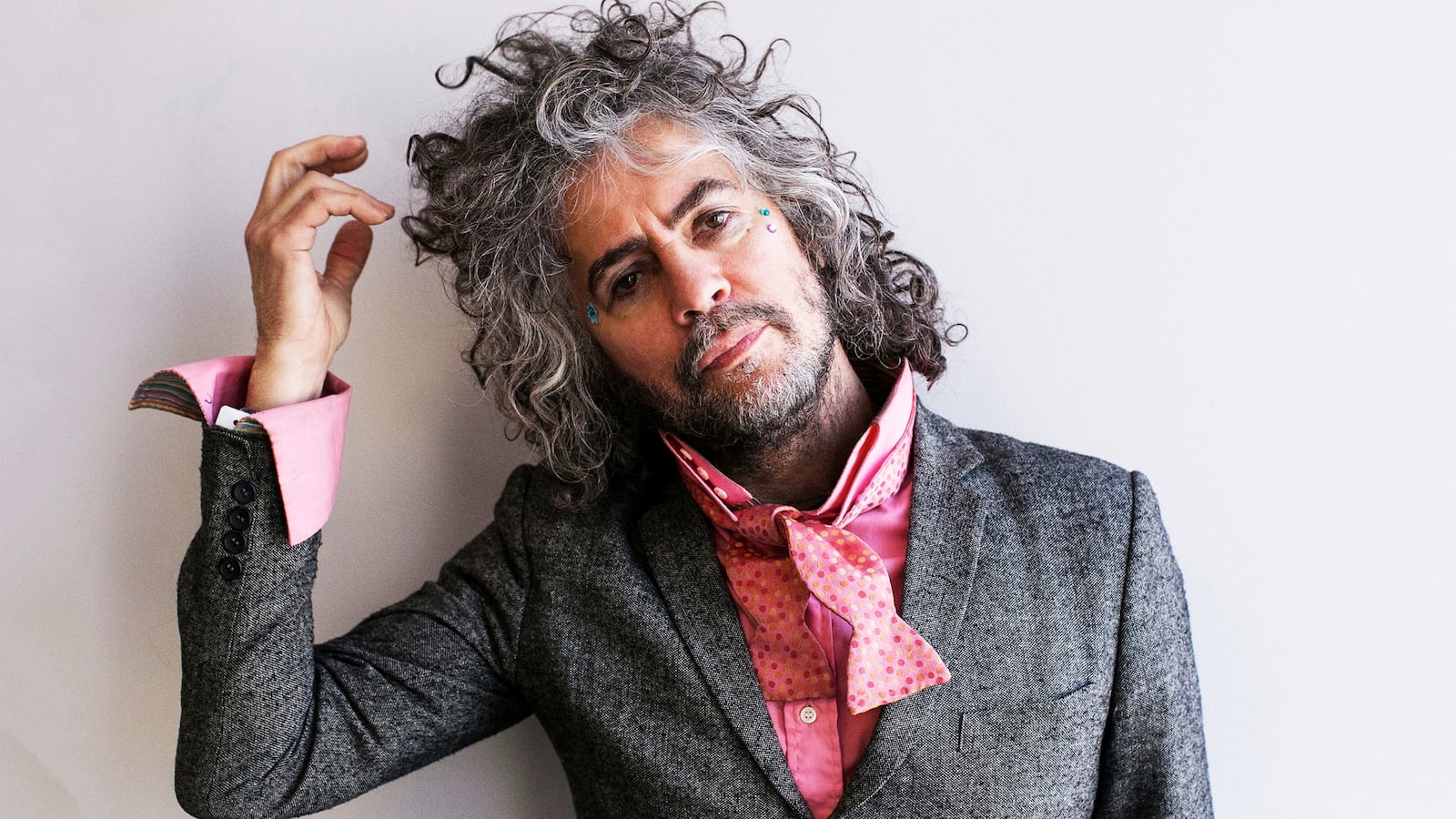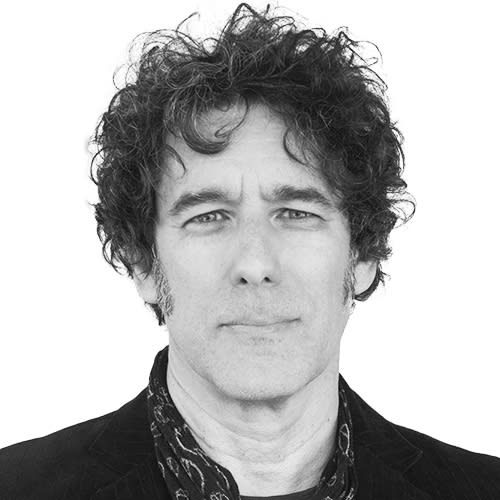The Flaming Lips have always been one of rock’s most consistently weird and confounding bands. For every album like 1999’s near-perfect The Soft Bulletin or 2002’s Yoshimi Battles the Pink Robots, there are projects that many have considered creative follies, like their Pink Floyd homage from 2009, and the 2008 film Christmas On Mars, not to mention their 2015 collaboration with Miley Cyrus.
But taken together, the arch of the Flaming Lips’ creative output has been consistently fresh—especially for a major label, chart-topping band—with the artistically adventurous moments outweighing the misses by a mile, as evidenced on their expanded, deluxe edition of 2018's Greatest Hits, Volume 1.
Nowhere is the band’s bold vision more evident than on its new album King’s Mouth, out on limited edition vinyl for Record Store Day, with a full release coming later this year. A full-on, old-school concept album, King’s Mouth again breaks new ground—while retaining enough of a sonic connection to the Soft Bulletin and Yoshimi-era Lips music to make it feel immediately familiar to the band’s legion of fans.
Shamanic lead singer Wayne Coyne recently spoke to The Daily Beast about what King’s Mouth is all about, how Donald Trump is irrelevant to him, and why keeping it local is really what it’s all about.
In the run-up to the release of the album, there was a lot of chatter on the internet that given its title—King’s Mouth—it would be a Trump parable, or Brexit parable. So is it allegorical? Because you’ve told me before that you don’t see yourself as a political artist, no matter how outspoken about your beliefs you sometimes are.
Wayne Coyne: The same thing happened when Yoshimi Battles the Pink Robots was almost turned into a musical. There was a brief meeting—a doomed meeting, in a sense—with Aaron Sorkin. And he thought it could be about the Bush administration and 9/11. And honestly, it could be, with Aaron Sorkin working on it. But he asked me if I’d like that, and I said, “No.” As much as I don’t like Trump, and as much as I don’t like Brexit, and as much as I didn’t like George W. Bush, I’m just not in that world. My stuff isn’t sarcasm, and it’s not political satire. In hindsight, I’m probably the only person who’s ever said no to Aaron Sorkin in the last 30 years. And I do wish, in a sense, that I would have said yes and let him turn it into something more overtly political, because I think it then could have had two meanings. It could have the meaning I wanted it to, and it could have had the meaning he wanted. But part of me probably would have horribly regretted it, too. So with King’s Mouth, because everybody is pulling their hair out about Trump, people are looking for any story that seems to be political. “We’re going to win here in the end, right?”
And the idea has been around for quite a while, hasn’t it?
That’s right. King’s Mouth started way, way back in 2014 at our gallery. We would have parties at our gallery, and people would be in there 4:00 in the morning—10 people, all laying on each other in this cylinder we’d built, looking at these crazy movies that were all in sync with the sound and lights we’d created for it. And then the curator for the American Visionary Arts Museum from Baltimore—a music critic guy that I’ve known for a while—became interested in us doing the King’s Mouth installation there. He got us to go to the next level. So the album started out initially as music that we made for the installation, as this wordless, abstract story. And for the first year or two, it was just that. But it really compelled us. Because at the end of experiencing the installation, you would kind of walk away feeling like you’d received some biblical message from outer space. People would say, “What is this? What’s the story?” So the curator at the museum said, “You should just make up a story.” And I did. Just willy-nilly, really. Because everything always has to be done in such a hurry. “We need it tomorrow!” But I think sometimes that really helps when you have to just go with your intuition.

You’ve collaborated with Miley Cyrus, and worked with orchestras on live versions of Soft Bulletin and Yoshimi, and you’ve got Mick Jones from The Clash on this album, and now you’re saying this piece was in large part inspired by this gallery owner from Baltimore. There are very few artists who are as open to collaboration as you guys are. It seems you really feed off other people’s ideas and intuition for maybe finding your path forward.
We talk about this within the group a lot. I think artists can be pretty satisfied working on their own, in the sense that if you do a painting in your house, you feel as though it’s great, and when you finish it, it stays in your house, and you’re pretty satisfied. But somewhere along the way, you do wonder, “Is this working? Because I’m not just baking these cookies for myself. I do want people to like them. And I do want this message to be understood.” And so I think there’s plenty of things that I get to do that are absolutely me within the Flaming Lips music. There’s never a day that I think, “There should be more me going on there.” But I want to know that it’s having an impact. I want to know that the bits that are supposed to be funny make people laugh, and the ones that are sad make people sad. So that type of evolution, where it’s not just me, and there are other people involved—where I have to trust their actions and they have to trust mine—if they are really good at what they’re doing, the relationship really is all of it. It’s not resentment and it’s not a competition. It’s love. And King’s Mouth becoming an installation, and then everything that evolved from that was a five-year evolution of work, work, work, that was truly collaborative in the best sense.
The album has such a cinematic feel to it, and such a broad palette sonically. Do you feel as though that long gestation period, when you were working with orchestras, helped expand your horizons creatively, too?
Well, when we started to come up with the sound palette, part of it was that the story is set in—I hate to say it, because we didn’t think of this at the time—but kind of a Game of Thrones scenario. But in the future, and from outer space, although in sort of medieval times. So we would say, “Medieval, from outer space? The Flaming Lips are perfect for that.” So whenever we ran into the question of “what’s this going to sound like?” we would easily go for these big brass horns and big choirs—big, big choirs! We wanted it to be evocative of medieval monks. And so we veered away from being a rock group. And the story, I think, really helped. I know that it’s one of my dilemmas, thinking something needs 100 pieces, when in the end it only really needs five, because when we have time to keep working on something, it easily gets giant and huge and out of control—usually in the first week we work on it—but over three or four years we hone it back to just three or four essential things. And I think that process has really worked well for us.
That’s almost like when Paul McCartney came up with the idea of The Beatles not being The Beatles, but being Sgt. Pepper’s Lonely Hearts Club Band in the studio, because it freed them to be whatever they wanted to be. Did the medieval/futuristic approach free you from being the Flaming Lips, in a way?
Absolutely! Because now we’re not the Flaming Lips, we’re really telling this other story. The minute I jump into fantasy, I convey more truth than if I was trying to sing like James Taylor. I mean, James Taylor does it amazingly, but I’m not like that. So I never sing about me. I sing about pink robots, which is, on some level that I’m not so aware of, really just me singing about my dumb little life. But I would be utterly embarrassed and not capable of doing it if I didn’t have these characters and these otherworldly things to put it into. And I’m aware of that. I don’t feel like I’m hiding that. I just like it better when it’s not about me, even though it has to be about me. Really, it’s the only way it means anything. And I do love telling a story. I think that’s part of why we love making records so much, we kind of feel like this song can go with that song, and that song, and then it becomes something else.
So it’s not Donald Trump; it’s not Brexit. But you are very vocal about the times we live in. I’ve been to Oklahoma recently, near where you’re from, so I’ve got an idea of where you’re coming from. Tell me your perspective, as a blue guy in a red state, or a psychedelic guy in a red state.
The king in my story, the reason he’s king, is because he serves everybody. He loves everybody. And he’s stronger than everybody, so he helps everybody. Nobody serves him. That’s why the people love him so much. And his head is connected to the universe, and he dies tragically, but even though he’s dead, his giant head is still connected to this piece of the universe. So their way of having this memorial to him is by cutting off his head, because his head is so big, you can climb in through his dead mouth and still see the universe that’s connected to the top of his head. I mean, it’s a fantastical biblical cartoon, but the king in my thing, he’s not a ruler; he’s not an evil king. The reason they cut off his head is because they want to make a statue out of him. The king we had in our gallery, that’s the way I kind of saw it: He was this giant man and they cut his head off because his head happens to be connected to this psychedelic porthole that you can go inside of and you can see through.
He’s beloved and generous, so he’s an anti-Trump character. Is it a reflection of what we’re going through?
Maybe that’s the subconscious parts I was talking about before that I’m putting in there. But really, I don’t even consider Donald Trump. To me, what he wants is to be considered. He loves being hated. He loves being the dumbass. I’ve never really ever thought, “Oh, who’s running the country? Who’s the president? I guess I should care because it’s going to affect my life.” Seven months ago, here in Oklahoma, pot became legal. And Donald Trump is in office going on two years. But the city that I live in, Oklahoma City, is more progressive and freakier than it’s ever been with any president, ever. So I’ve always told people, and I still say this, even now, “It doesn’t matter who’s president.”
I was more glad it was Barack Obama than I’m glad it’s now Donald Trump, but what you do in your own house, in your own neighborhood, in your own little part of the city? You can have an impact on that. Your vote might have an impact on who becomes president, or not, but what you do in your little city trumps that by a thousand percent. That’s a lot more important. Most people don’t want to do anything with their neighbors, but they want to have some say in who’s the president of the United States. And I say, I’m just the opposite. I want to take care of my neighborhood, and my neighborhood to take care of me. I don’t know what the president’s going to do for me, but I know I can do things in my neighborhood and my neighbors can do that for me.

How did you connect with Mick Jones of The Clash, and why did you feel he was the right narrator for King’s Mouth?
I really can’t tell you why we were so insistent that it be Mick Jones. I mean, I fully expected him to not be interested and we would just move on. We had tried some of the narration where each of us in the band did, but it became, “Well, if no one else in the whole world will do it, we’ll do it. But let’s start at the top.” But Mick was the only one that we were trying to get.
It’s like, Stanley Unwin, who did the narration for the Small Faces’ Ogdens’ Nut Gone Flake. It wouldn’t be the same album without him. I can’t imagine anybody else but Mick Jones telling the story.
I was so surprised and pleased. But I’m always self-conscious. I kept thinking, “Until this thing actually comes out, if Mick says he changed his mind, I’ll say I understand.” You know what I mean? People would remind me, as we were finishing up the record, “I can’t believe you got Mick Jones on this.” And I was like, “Oh, fuck, I know.” So I wanted this to happen, and I think it’s great, and now that the record’s getting ready to come out, I’m feeling like it’s real.
It sounds like you didn’t really have a contingency plan, which is kind of the cool thing.
Well, if Mick had not wanted to do it, I would have put one together. After I begged and begged! I would have said, “Don, you’ve got to work on it.” Because my second and third plan would have been to keep trying for Mick. I remember when we did collaborations with Yoko Ono, back in 2011, Sean Lennon saying, “Yoko’s not going to do it.” And I was like, “Come on. I’m sure that we can get her to do it.” And I think she said no seven or eight times, and then I think I just caught her by surprise. Like she didn’t remember that she had said no, and she suddenly said yes. So I was like, “Well, let’s do it!” So it never hurts to ask. And then you ask again until they say yes.


